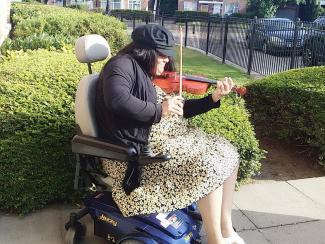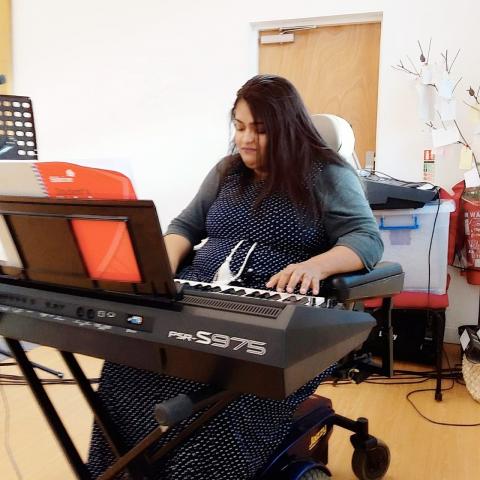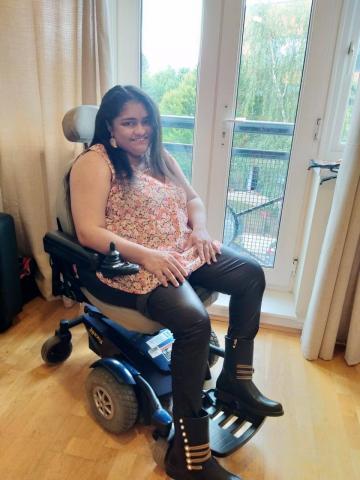
Jolene Dias, who was diagnosed with Limb Girdle Muscular Dystrophy, persevered her passion for music against adversities. From a celebrity singer, she began to teach music to children, including those with special needs, and challenge preconceived notions about people on wheelchairs.
I was an extremely active child, good in sports and studies. I used to love to sing, dance, and perform. In school, I was at the center of all music shows, singing classes, and choir practices. I have been passionate about music since age 5. I probably got drawn to it because of my grandmother. She had a beautiful voice. She used to sing Goan songs to me. And I used to cherish those moments. When my parents saw my strong streak for music, they enrolled me in piano lessons. And along with piano, I also began playing the keyboard and violin and learned singing and music theory.
As I grew older and my fervor for music intensified, I began to nurse dreams of becoming a famous vocalist, a star, one day.
Incurable fever
But sometimes reality can destroy dreams…as it happened with me.
In 2002, at age 13, I had gone to a school camp. When I returned I felt sick and feverish. My mom said it must be exhaustion, and suggested I rest and sleep. But by night, I had a high fever and my body was burning. This continued for several days. I began experiencing shivers, weakness, and loss of appetite. The local doctors in Margao, Goa, where I lived, prescribed paracetamol thinking it was a viral infection. But my fever persisted. Later, I was diagnosed with typhoid. I was admitted to a hospital and had to stay there for nearly 20 days. But my fever continued despite antibiotics. So the doctors tripled my dose of antibiotics. This cured my fever, but it severely affected my leg.
Weakness in the limbs
I felt my leg had become weak. Initially, I dismissed it as long-drawn hospitalization, but as months passed, I began sensing unusual changes in myself. My pace of walking had slowed down. Even though I wanted to walk fast, I was finding it difficult to keep pace with others. I wish my friends were more empathetic and understanding. I also began having problems climbing staircases. There was a time when I would jump two steps at a time, to run for my music classes. But now I had to negotiate each step carefully and would get exhausted easily. Or if I sat on a low surface, I had to struggle to get up on my feet. Even my athletic stamina had vanished. I couldn’t complete a round of the school field without being totally drained out.
Adjusting at School
My limp and waddle began affecting me at school. Nobody really understood what I was going through as I was normal all these years. Mockery and jeers from peers started increasing. Some students felt that I was just pretending to be walking differently, while others felt that I was trying to gain attention. Even teachers were perplexed and finally asked my parents to seek medical advice. The doctors in Goa referred me to a neurologist at Jaslok Hospital, Mumbai.
Limb Girdle Muscular Dystrophy diagnosed
At Jaslok, I had to undergo an EMG test. (An electromyography used to diagnose and monitor muscle dysfunction.) The EMG test was excruciatingly painful. I still remember I felt as if I was being crucified on the cross with the huge needles being pierced in my arms, hips, and ankles. I was screaming in pain.
When the report came, I was diagnosed with Limb Girdle Muscular Dystrophy (LGMD), a rare progressive genetic disorder that is characterized by wasting (atrophy) and weakness of the muscles in the limbs (legs and arms) and girdle area (hips, pelvis, abdomen). At that time, not much was known about LGMD and its management. So we returned to Goa quite clueless about my disorder.
I felt my legs getting increasingly unsteady and infirm. Even walking was becoming a challenge. I would often lose my balance and fall while walking. In Std 12, I must have fallen at least 50 times while walking, particularly when the surface was too smooth or uneven. I couldn’t get up on my own and needed assistance. Around the same time, climbing with my left leg stopped totally. I used to climb one step with my right leg, and drag my left leg up.
Bollywood Dreams
In 2009, despite setbacks and crippling weakness, I held onto to my dream of becoming a celebrity musician. As I completed my studies I decided to work on my passions instead of my academics. I began to pursue my other allied interests. I did graphic designing, video editing, film making too. I had even auditioned as a news anchor. I set up my own music academy, Blue Ocean Waves, and began recording my own albums. I used to sing in Konkani, Hindi, English, and other regional languages. When my Malayalam song became a hit, people began recognizing me. Then followed my Hindi single, which really made me a star. I received a big round of accolades from top musicians. It was titled Thodi Alag Hoon that started with the slide ‘Disability is not Inability. It’s a different ability…” I began being interviewed as an upcoming talent by various newspapers and television channels in Goa. Maybe they saw me struggling with my disability and found me inspiring. Nevertheless, I was thrilled to see my photo in the papers. I was finally getting the limelight I had been yearning for.

Wheelchair – the lifesaver
But along with increasing popularity and recognition, my LGMD started getting more constraining. My struggles became immense. I had to really push myself to do anything. By the time I was 27, I had no option but to use a wheelchair.
My movement got restrictive. Now I had to consider where I was going. I started opting for studios that were on the ground floor for my recordings and began avoiding those with steps. The biggest challenge was attending concerts and performances in auditoriums, or going to a supermarket, or visiting a store. I could not even attend church because of inaccessibility. If I had to go for an important appointment on the second floor, for instance, I had to be lifted up in my wheelchair by four or five men. Or at times, ramps would be so steep that, even with the assistance I would feel giddy or scared of falling. It was extremely uncomfortable. I felt my dignity and self-esteem is affected.
I realized I could not go on further being a celebrity singer, as my mobility was becoming a bother. I stopped recording songs and instead decided to teach music to children. I included children with special needs among my students. Interacting with children with various disabilities put my own handicap in perspective. I began to realize that my disability was not such a big issue compared to theirs. I increased my engagement with these children. I started visiting schools for special needs children in Goa and Mumbai and taught them music.
In 2018, I had to shift base from Margao to Panaji because I began facing opposition to my music classes. My neighbors and society people in Margao started harassing me and tried to stop me from teaching. But I did not want to stop my music. I wanted to be independent and wanted to have that peace of mind.

It has been 12 years now since I have been teaching music. I teach keyboards, piano, music theory, vocals, and violin and prepare students for music exams from reputed boards like Trinity College London, The Associated Board of Royal School of Music, and Rockschool London. Many of my students have secured distinctions and merits.
London- The turnover
In 2019, I shifted base with my mother to London. Living in Goa, one is not aware of the excellent facilities available in the UK to people with disabilities. It is only when one comes to London and witnesses the comforts available, one can actually feel the difference between London and Goa or rather India as a whole. In London, I have my own powered wheelchair. I feel more independent here as I can go shopping on my own. I visit government offices by myself. I can cross roads without assistance. All pavements have ramp endings. Buses and trains are very accessible too. I feel that people with disabilities are respected and loved and supported to the fullest here. The government has provided my medical equipment and carers because of my disability which I would not get back home.
I have registered Blue Ocean Waves in the UK and started teaching music to children. Through my music, I hope to challenge preconceived notions about people in wheelchairs. I wish to encourage others to follow their aspirations and not give up. One should always try to be self-sufficient and self-reliant, no matter what the challenges. Here is a line from Beethoven that inspires me…
The barriers are not erected which can say to aspiring talents and industry, 'Thus far and no farther. ' - Ludwig van Beethoven.
My Hindi video Thodi Alag Hoon https://www.youtube.com/watch?v=NLXAh3lXjLM
My documentary film https://youtu.be/AkQBtHe-1c0






